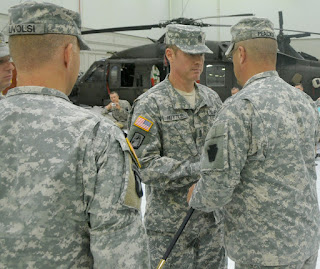CW2 Sara Christensen
In 1985, when President Ronald Reagan was just beginning his
second term, the Soviet Union was fighting in Afghanistan and the Cold War was
still a hot topic, Sara Christensen enlisted in the Army Reserve. She lived in California, had just graduated
from high school and wanted to be a dental technician.
The following year she went to Basic Training and MOS
training at Fort Sam Houston in Texas.
In Texas she met her future husband Kelvin Christensen. He was an E5 on his way to Officer Candidate
School (OCS) in California with the Army National Guard. Although just a Private at the time, Sara
managed to get accepted for OCS. Kelvin
and Sara went through the course together and were commissioned 2nd
Lieutenants.
At this point, the Christensen’s were both officers. They chose Aviation as their branch and
eventually went to flight school. Sara
trained in Hueys, Kelvin in Blackhawks.
By 1991 they both had transferred to the Pennsylvania National Guard
serving as aviation officers.
At
this point both Sara and Kelvin were well on their way with their second Army
careers as commissioned officers. Kelvin
continued with his career in aviation and currently is a Lieutenant Colonel and
is the Cargo Battalion Commander for the Eastern Army National
Guard Aviation Training Site (EAATS) on Fort Indiantown Gap.
Four years later, in 1995, the Christensens decided to go
from no kids to three kids all at once.
They adopted three children from the Pennsylvania Foster Care system who
need homes. With three kids, Kelvin and
Sara both continued their careers in the Army.
By 2001 the already larger than average family had more than
doubled to seven kids and Captain Sara Christensen left the Army National Guard
for the Individual Ready Reserve (IRR).
She kept her commission and, in fact, was promoted to major while on
inactive status.
After more than a decade of raising seven kids, Sara decided
to return to Army Aviation after a thirteen-year break in service. The timing was critical because the maximum
age to return to aviation service is 46 years old. She made the deadline, beginning her third
Army career as a Warrant Officer. She
could have come back as a commissioned officer and been eligible for promotion
to Lieutenant Colonel, but she wanted to fly and would have more opportunities
to be in the cockpit as a warrant officer.
In addition to beginning Army service for a third time, she
has now held rank in all three sections of the chain of command: enlisted, officer, and warrant officer.
Despite being three years in to what a third Army career, Chief
Warrant Officer 2 Sara Christensen is currently training for her first combat
deployment. She is a pilot with
Detachment 1, Charlie Company (Medevac), 2-104th General Support
Aviation Battalion, 28th
Combat Aviation Brigade. She is training
in Texas for deployment to Southwest Asia later this year.





















